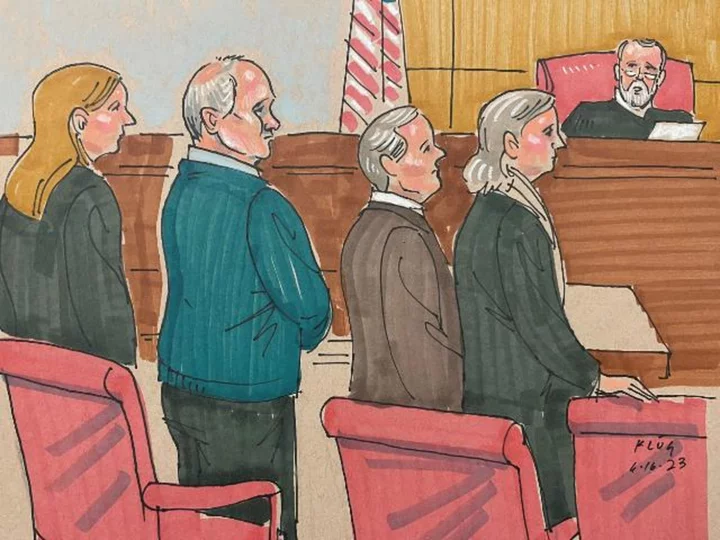The Pittsburgh synagogue mass shooter acted irrationally due to mental health problems and had a history of psychotic symptoms consistent with schizophrenia, his defense attorneys said in the punishment phase of his death penalty trial Monday.
"The structure and the function of Mr. (Robert) Bowers' brain is impaired," causing him to form delusional beliefs, attorney Michael Burt told the jury. "Those delusional beliefs led directly to the horrible events of October 27, 2018."
Prosecutors, by contrast, argued Bowers carried out the attack with extensive planning and with a clear plan to kill every Jewish person he came across.
"His intent is crystal clear from his actions and from his words," prosecutor Troy Rivetti said.
The dueling arguments about his mental acuity will be the central focus of the punishment phase of the trial as the jury hears evidence on aggravating and mitigating factors, and considers whether to sentence him to death or life in prison.
Bowers, 50, was found guilty on June 16 of all 63 charges against him for killing 11 worshippers and wounding six others at a Pittsburgh synagogue in 2018, the deadliest ever attack on Jewish people in the US. Twenty-two of those counts were capital offenses, so he is eligible for the death penalty.
The charges stem from the attack on October 27, 2018, when Bowers stormed into the Tree of Life synagogue in Pittsburgh's Squirrel Hill neighborhood and killed 11 people and wounded six others. The shooting unfolded on a day when the synagogue was hosting three congregations, Tree of Life, Dor Hadash and New Light, for weekly Shabbat services.
Prosecutors called 60 witnesses over more than two weeks to argue he executed the attack because of his hatred for Jewish people, citing a series of antisemitic comments before, during and after the mass shooting, online and in person.
The gunman stated matter-of-factly, "All Jews had to die," one responding officer testified. On the far-right website Gab, he particularly criticized migrants as "invaders" and repeatedly disparaged the Hebrew Immigrant Aid Society, which provides support to refugees.
Bowers' defense did not dispute he carried out the massacre but raised questions about the antisemitic motive.
Focus on mental health
With his guilt established, this punishment phase of the trial looks to focus on Bowers' mental ability and intent.
Rivetti argued Monday the government had to prove that Bowers is over 18, that he acted with sufficient level of intent and that there was an aggravating factor applied to the mass shooting. He said there were four aggravating factors: Bowers presented a "grave risk of death to additional persons," he showed substantial planning and premeditation, the victims were "vulnerable," and there were multiple killings or attempted killings.
"He intentionally shot and killed each of these victims," he said. "You know the defendant's intent from those facts alone, but there is so much more: the defendant's research and planning, his posts on Gab on HIAS, he drove a half-hour to synagogue, his car loaded with ammunition, and he made decision after decision at the Tree of Life synagogue."
"He came to kill and each decision he made shows his intent," he added.
Burt, the defense attorney, said they planned to focus on the defendant's "past medical and psychiatric history" to try to show he did not have a sufficient level of intent in his actions.
"That level of intent is not sufficient to allow for consideration of death penalty," he said.
Bowers had multiple suicide attempts, the attorney said, and brain tests showed he had epilepsy and irregularities consistent with schizophrenia, which affected the development of his brain. "(It is) evident he has a psychotic condition that has been long-standing," since childhood, he argued.
Only 2nd death penalty trial in Biden Administration
The Justice Department under Attorney General Merrick Garland is prosecuting the case, making it the second federal death penalty trial of the President Joe Biden's administration.
Most of the families of those killed at the synagogue want the shooter sentenced to die, according to a letter to the editor of the Pittsburgh Jewish Chronicle published in November. The letter was signed by seven of the nine families whose relatives were murdered.
"Please don't tell us how we should feel, what is best for us, what will comfort us and what will bring closure for the victims' families. You can not and will not speak for us," the families wrote. "The massacre of our loved ones was a clear violation of American law -- mass murder of Jews for simply being Jewish and practicing Judaism, driven by sheer antisemitism -- which the law rightfully deems is a capital offense."
Diane and Michele Rosenthal, the sisters of victims David and Cecil Rosenthal, offered their support for the death penalty in April.
"(The) massacre was not just a mass murder of innocent citizens during the service in a house of worship. It was an antisemitic hate crime," Diane Rosenthal said. "The death penalty must apply to vindicate justice and to offer some measure of deterrence from horrific hate crimes happening again and again."
Others have offered a different view. The Dor Hadash Congregation previously voiced its opposition to the death penalty in this case. So, too, did Jonathan Perlman, the rabbi of New Light Congregation, who narrowly escaped the shooting.
"A drawn out and difficult death penalty trial would be a disaster with witnesses and attorneys dredging up horrifying drama and giving this killer the media attention he does not deserve," he wrote in an August 2019 letter to then-Attorney General William Barr.
Biden campaigned on a promise to abolish the death penalty at the federal level but has taken few substantive steps toward doing so. Still, he has put in place a moratorium on executions, a contrast to the final months of the Trump administration, when 13 people were executed.

